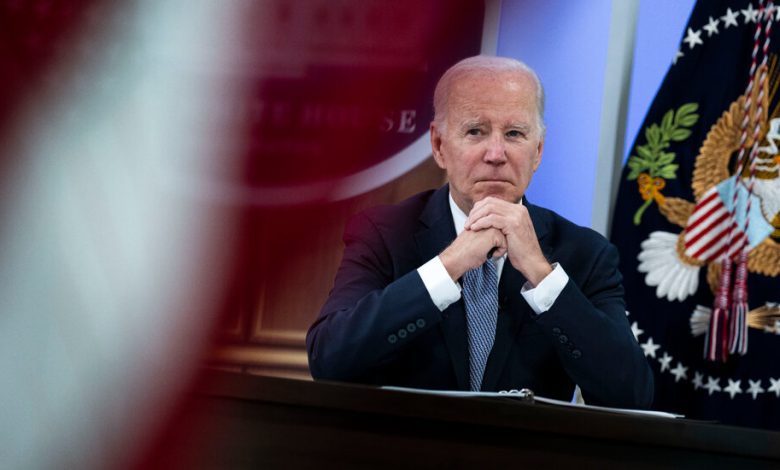Biden Faces His First Big Choice on Debt Limit

WASHINGTON — This week’s vote by House Republicans to couple deep spending cuts with an agreement to raise the debt limit for one year has put President Biden on the defensive, forcing him to confront a series of potentially painful choices at a perilous economic moment.
Mr. Biden has long maintained that he would not negotiate spending cuts or other efforts to reduce the federal debt as part of discussions over raising the nation’s debt limit, which must be raised in order for the United States to keep borrowing money to pay its bills.
But business groups, fiscal hawks and some congressional Democrats are calling on Mr. Biden to begin negotiating in earnest toward a deal that would avoid a default on the debt, which could come as soon as June or July.
Mr. Biden and his aides now must choose how quickly to engage with Speaker Kevin McCarthy of California — along with Senator Chuck Schumer, Democrat of New York, the majority leader; Senator Mitch McConnell of Kentucky, the minority leader; and Representative Hakeem Jeffries of New York, the House minority leader — and on what terms.
The president faces a cascading set of decisions as the nation, which has already bumped up against its $31.4 trillion debt limit, barrels toward default. He will need to find what, if any, common ground on spending cuts he has with Republicans, who do not share his preference for reducing the nation’s debt path largely by raising taxes on corporations and the rich. He will need to determine if he is prepared to sign any debt limit increase that is attached to conditions demanded by House conservatives.
Ultimately, he may need to decide how aggressively to intervene in the delicate politics of House leadership. A potential debt-limit agreement could spur revolt by Mr. McCarthy’s most restless members, who laid the groundwork for the current brinkmanship when they held out against Mr. McCarthy’s ascension to the speaker’s gavel and retain the power to try to push him out.
As administration officials describe it, they are all complicated choices. Mr. Biden and his aides do not want to encourage Republicans to habitually threaten economic collapse under Democratic presidents — and only under Democratic presidents — by allowing them to extract concessions to raise the limit now. They also recognize that a recession set off by default would hammer American families just as Mr. Biden is ramping up his re-election campaign, a dangerous scenario for an unpopular incumbent no matter which party voters blame for the default.
Some of Mr. Biden’s next steps are clear. To the chagrin of some House conservatives, there was no scenario in which the president would sign the bill that barely cleared the chamber on Wednesday. Along with raising the limit, it included spending cuts, new supports for oil and gas drilling and the near-total reversal of Mr. Biden’s signature law meant to fight climate change.
“The president has made clear this bill has no chance of becoming law,” Karine Jean-Pierre, the White House press secretary, said on Wednesday after the vote. “In our history, we have never defaulted on our debt or failed to pay our bills. Congressional Republicans must act immediately and without conditions to avoid default.”
But that does not mean Mr. Biden will be able to maintain his current posture toward Mr. McCarthy indefinitely. Administration officials have pushed business groups to pressure Republicans to pass a no-strings debt limit increase. But on Wednesday, leading business lobby groups, including the U.S. Chamber of Commerce and the Business Roundtable, lauded the House passage of the bill and called on Mr. Biden to engage.
“Failing to raise the debt limit would trigger a strong market reaction with severe economic consequences, likely including widespread job losses, decimated retirement savings and serious hardship for millions of American families,” said Joshua Bolten, president and chief executive of the Business Roundtable. The group, he said, “is hopeful that today’s vote in the House will jump-start negotiations between Congress and the Biden administration on a bipartisan deal that takes default off the table and begins the hard work of dealing with our deficits and debt.”
White House officials concede that Mr. Biden will have to convene negotiations with congressional leaders over taxes, spending and debt before the government runs out of money to pay its bills. In recent days, the president has suggested an openness to talk fiscal issues with Republicans, with the wink-nod stipulation that they have nothing to do with the borrowing limit.
“I’m happy to meet with McCarthy, but not on whether or not the debt limit gets extended,” Mr. Biden told reporters at the White House on Wednesday. “That’s not negotiable.”
Mr. Biden still sees his position in any fiscal talks, and the public debate around them, as a political winner. In the early months of this year, he demonized Republican plans that included cuts to safety-net programs and forced Mr. McCarthy to make Social Security and Medicare — the two largest drivers of federal spending growth in the years to come — untouchable in the Republican bill.
More recently, officials across the administration have blasted the Republican bill for potentially cutting spending on popular programs for veterans, students and more. They are able to do that because the bill does not specify where the bulk of its spending reductions would come from, leaving the task to future congressional appropriators.
In a White House memo obtained this week by The New York Times, officials sketch out what they believe Republicans would have to cut in order to satisfy the spending caps in their legislation, while keeping military spending intact. Over a decade, the reductions would include $500 billion for veterans’ health care, $300 billion from scientific and other research and $100 billion from the early childhood education program Head Start.
Some administration officials privately suggest that a more modest version of spending caps, lasting for a few years at most, could plausibly form the centerpiece of an agreement to continue funding the government and raise the borrowing limit. Some business groups agree, though they would also like to see lawmakers add in a bipartisan effort to streamline government permitting for fossil fuels, clean energy and other projects, which they say would enhance economic growth.
But many House Republicans appear in no mood to move from the bill that passed with only one vote to spare on Wednesday, raising the possibility that a deal with smaller spending cuts would need a combination of Republican and Democratic votes to pass the House — and potentially set off an effort by conservatives to depose Mr. McCarthy as speaker.
Representative Ralph Norman of South Carolina, and a member of the Freedom Caucus, emerged from a closed-door briefing on the legislation ahead of the vote on Wednesday demanding that Republicans refuse to take anything less than their opening offer.
“I wanted double what was in there,” Mr. Norman said. “I agreed to vote for it because that starts the ball and gets us in the arena to solve the debt problem. Now I’m not interested in anything coming back, anything but what we voted on.”
Catie Edmondson contributed reporting.



